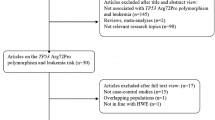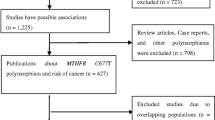Abstract
The association between the Arg194Trp polymorphism in the XRCC1 gene and the risk of hematological malignancies has been extensively investigated. However, the results were inconsistent. The objective of the current study is to investigate the association by meta-analysis. We searched the PubMed, Embase, CNKI, Wanfang, and Weipu databases, covering all studies until Aug. 7, 2013. Statistical analysis was performed by using the RevMan4.2 software and the Stata10.0 software. A total of 20 case–control studies concerning the Arg194Trp polymorphism were indentified from 19 articles. In total analysis, our results suggested that the Arg194Trp polymorphism was not associated with an increased/decreased risk of hematological malignancies (odds ratio (OR) = 1.01, 95 % confidence interval (CI) = 0.85–1.22, P = 0.87 for Arg/Trp+Trp/Trp vs. Arg/Arg). In the subgroup analysis by ethnicity, no significant association was found either among Asians (OR = 1.04, 95 % CI = 0.84–1.29, P = 0.72) or among Europeans (OR = 1.04, 95 % CI = 0.72–1.49, P = 0.83); in the subgroup analyses by cancer types, no significant association was found either among leukemia (OR = 1.10, 95 % CI = 0.89–1.35, P = 0.39) or in lymphoma (OR = 0.83, 95 % CI = 0.57–1.22, P = 0.35). The current meta-analysis indicated that the Arg194Trp polymorphism in the XRCC1 gene might be not a risk factor for hematological malignancies. In the future, more large-scale case–control studies are needed to validate these results.





Similar content being viewed by others
References
Ward AF, Braun BS, Shannon KM. Targeting oncogenic Ras signaling in hematologic malignancies. Blood. 2012;120(17):3397–406. doi:10.1182/blood-2012-05-378596.
Irvine DA, Copland M. Targeting hedgehog in hematologic malignancy. Blood. 2012;119(10):2196–204. doi:10.1182/blood-2011-10-383752.
Weng Y, Lu L, Yuan G, Guo J, Zhang Z, Xie X, et al. p53 codon 72 polymorphism and hematological cancer risk: an update meta-analysis. PloS ONE. 2012;7(9):e45820. doi:10.1371/journal.pone.0045820.
Smith AG, Fan W, Regen L, Warnock S, Sprague M, Williams R, et al. Somatic mutations in the HLA genes of patients with hematological malignancy. Tissue Antigens. 2012;79(5):359–66. doi:10.1111/j.1399-0039.2012.01868.x.
Simons A, Sikkema-Raddatz B, de Leeuw N, Konrad NC, Hastings RJ, Schoumans J. Genome-wide arrays in routine diagnostics of hematological malignancies. Hum Mutat. 2012;33(6):941–8. doi:10.1002/humu.22057.
Kroeze LI, Nikoloski G, da Silva-Coelho P, van Hoogen P, Stevens-Linders E, Kuiper RP, et al. Genetic defects in PRC2 components other than EZH2 are not common in myeloid malignancies. Blood. 2012;119(5):1318–9. doi:10.1182/blood-2011-07-365213.
Jagasia M, Clark WB, Brown-Gentry KD, Crawford DC, Fan KH, Chen H, et al. Genetic variation in donor CTLA-4 regulatory region is a strong predictor of outcome after allogeneic hematopoietic cell transplantation for hematologic malignancies. Biol Blood marrow Transplant J Am Soc Blood Marrow Transplant. 2012;18(7):1069–75. doi:10.1016/j.bbmt.2011.12.518.
Li Y, Liu F, Tan SQ, Wang Y, Li SW. X-ray repair cross-complementing group 1 (XRCC1) genetic polymorphisms and cervical cancer risk: a huge systematic review and meta-analysis. PloS ONE. 2012;7(9):e44441. doi:10.1371/journal.pone.0044441.
Cui Z, Yin Z, Li X, Wu W, Guan P, Zhou B. Association between polymorphisms in XRCC1 gene and clinical outcomes of patients with lung cancer: a meta-analysis. BMC Cancer. 2012;12:71. doi:10.1186/1471-2407-12-71.
Batar B, Guven M, Baris S, Celkan T, Yildiz I. DNA repair gene XPD and XRCC1 polymorphisms and the risk of childhood acute lymphoblastic leukemia. Leuk Res. 2009;33(6):759–63. doi:10.1016/j.leukres.2008.11.005.
Canalle R, Silveira VS, Scrideli CA, Queiroz RG, Lopes LF, Tone LG. Impact of thymidylate synthase promoter and DNA repair gene polymorphisms on susceptibility to childhood acute lymphoblastic leukemia. Leuk Lymphoma. 2011;52(6):1118–26. doi:10.3109/10428194.2011.559672.
Duman N, Aktan M, Ozturk S, Palanduz S, Cakiris A, Ustek D, et al. Investigation of Arg399Gln and Arg194Trp polymorphisms of the XRCC1 (x-ray cross-complementing group 1) gene and its correlation to sister chromatid exchange frequency in patients with chronic lymphocytic leukemia. Genet Test Mol Biomark. 2012;16(4):287–91. doi:10.1089/gtmb.2011.0152.
Kim HN, Kim NY, Yu L, Tran HT, Kim YK, Lee IK, et al. Association of GSTT1 polymorphism with acute myeloid leukemia risk is dependent on smoking status. Leuk Lymphoma. 2012;53(4):681–7. doi:10.3109/10428194.2011.625576.
Kim IS, Kim DC, Kim HG, Eom HS, Kong SY, Shin HJ, et al. DNA repair gene XRCC1 polymorphisms and haplotypes in diffuse large B-cell lymphoma in a Korean population. Cancer Genet Cytogenet. 2010;196(1):31–7. doi:10.1016/j.cancergencyto.2009.08.008.
Ji C, Liu Z, Chen H, Guo H, Liu C. An association between hOGG1 Ser326Cys polymorphism and the risk of bladder cancer in non-smokers: a meta-analysis. BMC Cancer. 2012;12:335. doi:10.1186/1471-2407-12-335.
Long XD, Ma Y, Zhou YF, Yao JG, Ban FZ, Huang YZ, et al. XPD codon 312 and 751 polymorphisms, and AFB1 exposure, and hepatocellular carcinoma risk. BMC Cancer. 2009;9:400. doi:10.1186/1471-2407-9-400.
Wang H, Zhang Z, Han S, Lu Y, Feng F, Yuan J. CYP1A2 rs762551 polymorphism contributes to cancer susceptibility: a meta-analysis from 19 case-control studies. BMC Cancer. 2012;12:528. doi:10.1186/1471-2407-12-528.
Zhang H, Xu Y, Zhang Z, Li L. The hOGG1 Ser326Cys polymorphism and prostate cancer risk: a meta-analysis of 2584 cases and 3234 controls. BMC Cancer. 2011;11:391. doi:10.1186/1471-2407-11-391.
Banescu C, Duicu C, Trifa AP, Dobreanu M. XRCC1 Arg194Trp and Arg399Gln polymorphisms are significantly associated with shorter survival in acute myeloid leukemia. Leuk Lymphoma. 2013. doi:10.3109/10428194.2013.802781.
Baris S, Celkan T, Batar B, Guven M, Ozdil M, Ozkan A, et al. Association between genetic polymorphism in DNA repair genes and risk of B-cell lymphoma. Pediatr Hematol Oncol. 2009;26(6):467–72. doi:10.3109/08880010903096201.
Joseph T, Kusumakumary P, Chacko P, Abraham A, Pillai MR. DNA repair gene XRCC1 polymorphisms in childhood acute lymphoblastic leukemia. Cancer Lett. 2005;217(1):17–24. doi:10.1016/j.canlet.2004.06.055.
Li J. Association of XRCC1 polymorphism with leukemia susceptibility in northwest Chinese population. Lanzhou: Lanzhou University. 2011 (in press)
Liu J, Song B, Wang Z, Song X, Shi Y, Zheng J, et al. DNA repair gene XRCC1 polymorphisms and non-Hodgkin lymphoma risk in a Chinese population. Cancer Genet Cytogenet. 2009;191(2):67–72. doi:10.1016/j.cancergencyto.2009.01.015.
Matullo G, Dunning AM, Guarrera S, Baynes C, Polidoro S, Garte S, et al. DNA repair polymorphisms and cancer risk in non-smokers in a cohort study. Carcinogenesis. 2006;27(5):997–1007. doi:10.1093/carcin/bgi280.
Meza-Espinoza JP, Peralta-Leal V, Gutierrez-Angulo M, Macias-Gomez N, Ayala-Madrigal ML, Barros-Nunez P, et al. XRCC1 polymorphisms and haplotypes in Mexican patients with acute lymphoblastic leukemia. Genet Mol Res GMR. 2009;8(4):1451–8. doi:10.4238/vol8-4gmr687.
Monroy CM, Cortes AC, Lopez M, Rourke E, Etzel CJ, Younes A, et al. Hodgkin lymphoma risk: role of genetic polymorphisms and gene-gene interactions in DNA repair pathways. Mol Carcinog. 2011;50(11):825–34. doi:10.1002/mc.20747.
Pakakasama S, Sirirat T, Kanchanachumpol S, Udomsubpayakul U, Mahasirimongkol S, Kitpoka P, et al. Genetic polymorphisms and haplotypes of DNA repair genes in childhood acute lymphoblastic leukemia. Pediatr Blood Cancer. 2007;48(1):16–20. doi:10.1002/pbc.20742.
Shen M, Purdue MP, Kricker A, Lan Q, Grulich AE, Vajdic CM, et al. Polymorphisms in DNA repair genes and risk of non-Hodgkin’s lymphoma in New South Wales, Australia. Haematologica. 2007;92(9):1180–5.
Shi JY, Ren ZH, Jiao B, Xiao R, Yun HY, Chen B, et al. Genetic variations of DNA repair genes and their prognostic significance in patients with acute myeloid leukemia. Int J Cancer J Int du cancer. 2011;128(1):233–8. doi:10.1002/ijc.25318.
Smedby KE, Lindgren CM, Hjalgrim H, Humphreys K, Schollkopf C, Chang ET, et al. Variation in DNA repair genes ERCC2, XRCC1, and XRCC3 and risk of follicular lymphoma. Cancer epidemiology, biomarkers & prevention: a publication of the American Association for Cancer Research, cosponsored by the American Society of Preventive Oncology. 2006;15(2):258–65. doi:10.1158/1055-9965.EPI-05-0583.
Zhu R, Wu Y, Lu FJ, Wang AH, Tang JY, Zhao JC, et al. Polymorphisms and haplotypes of XRCC1 and APE1 and risk of childhood leukaemia in China: a case-control analysis. Eur J Oncol. 2008;13(3):187–92.
Annamaneni S, Gorre M, Kagita S, Addepalli K, Digumarti RR, Satti V, et al. Association of XRCC1 gene polymorphisms with chronic myeloid leukemia in the population of Andhra Pradesh, India. Hematology. 2013;18(3):163–8. doi:10.1179/1607845412Y.0000000040.
Conflicts of interest
The authors declare no competing financial interests.
Author information
Authors and Affiliations
Corresponding author
Rights and permissions
About this article
Cite this article
Tang, L., Xiong, T., Jia, Q. et al. Study on the association between the Arg194Trp polymorphism in the XRCC1 gene and the risk of hematological malignancies. Tumor Biol. 35, 3009–3016 (2014). https://doi.org/10.1007/s13277-013-1388-5
Received:
Accepted:
Published:
Issue Date:
DOI: https://doi.org/10.1007/s13277-013-1388-5




